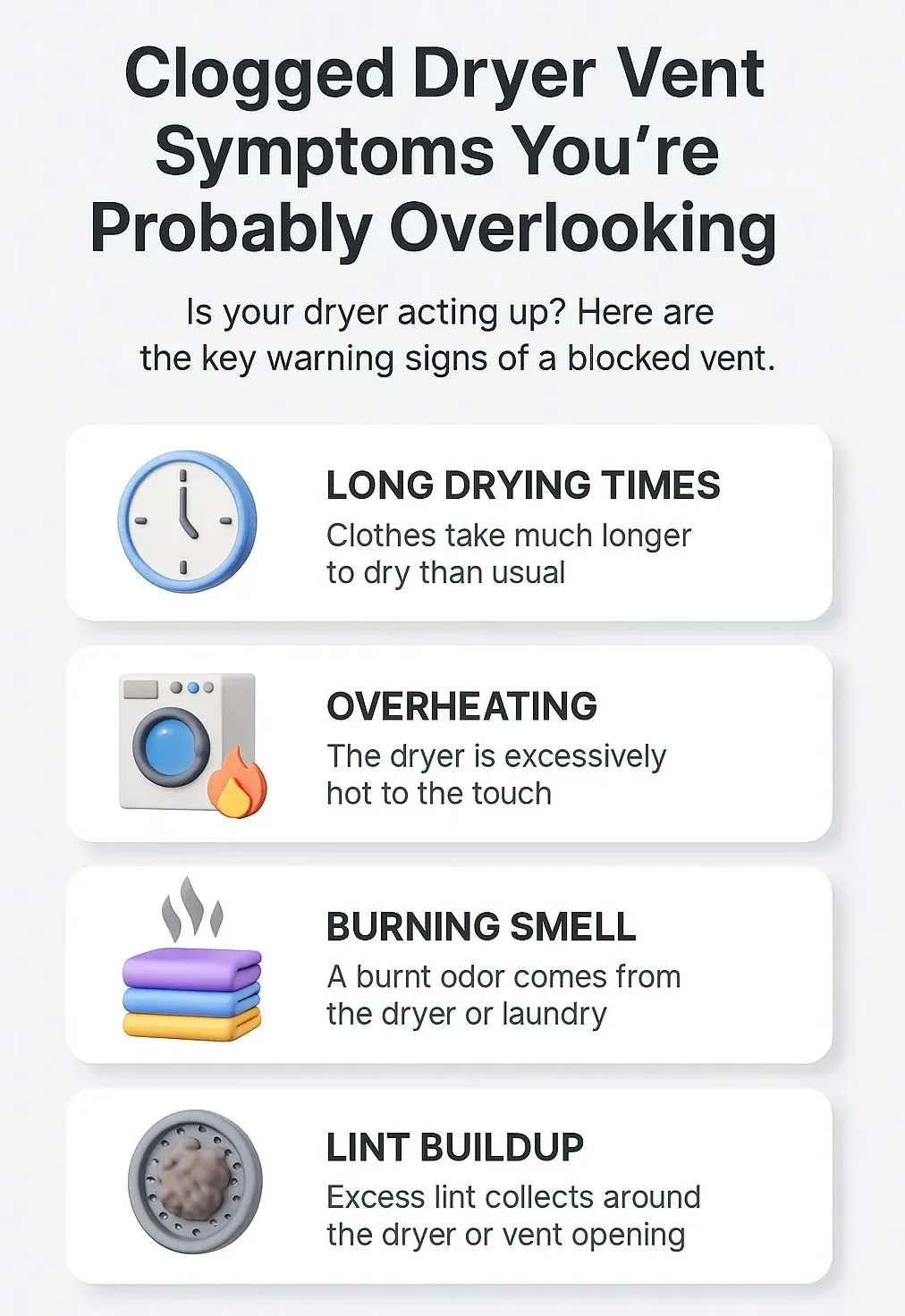Introduction: The Danger Lurking Behind Your Dryer
Most homeowners never suspect their dryer vent—until something goes wrong. You might chalk up longer drying times or a musty smell to an aging appliance, but these are red flags. Left unchecked, they can turn into costly repairs or even house fires. This guide reveals commonly overlooked clogged dryer vent symptoms and explains how recognizing them early can protect your home and save lives.
Top Takeaways
- Clogged vents increase fire and repair risks
- Symptoms often seem minor but escalate fast
Yearly maintenance boosts safety and efficiency
Common Symptoms You Shouldn’t Ignore
- Longer Drying TimesIf your clothes take more than one cycle to dry, it’s likely your vent is clogged and restricting airflow.
- Excessive Heat in the Laundry RoomA hot dryer or a steamy laundry room isn’t normal—it often means the vent is blocked and can’t release hot air properly.
- Musty or Burning OdorsA musty smell points to trapped moisture, while a burning smell signals dangerously overheating lint.
- Lint Accumulation Behind the Dryer or Vent CoverIf lint is spilling out or gathering around vent openings, your system isn’t venting efficiently.
- Dryer Shutting Off Mid-CycleMany dryers have a built-in safety shutdown when overheating—often due to restricted airflow from lint buildup.
Firsthand Insight From the Field

Real-World Cases That Prove the Point
The Simmons Family (Raleigh, NC):
Brushed off a burning smell and longer drying cycles. Result: severe lint buildup, internal wiring melted, $1,500 in damage.
“They were just days away from a fire.”40-Unit Apartment (Phoenix, AZ):
Tenants complained of poor drying and hot machines. Over half of the units had partially clogged vents.
Quick cleaning prevented a fire and dropped drying times by 25%.
Statistics That Back It Up
2,900 dryer fires occur yearly, causing approximately $35 million in damages
(U.S. Fire Administration – usfa.fema.gov)34% of those fires result from failure to clean dryer vents
46% of dryer fires extend beyond the appliance, spreading to walls or nearby materials
Final Thought: Awareness Is Your Best Defense
Most dryer-related disasters begin with subtle warnings. Longer drying times, excess heat, or a strange odor aren’t just quirks—they’re your home alerting you to a problem. If you feel something’s off, don’t wait. Address it now. Dryer maintenance isn’t just about efficiency—it’s about safety.
Next Steps: What To Do Now
Check behind your dryer for lint or poor airflow
Clean your lint trap after every load
Contact an expert if you notice odd smells or prolonged cycles
Educate your household on clogged vent warning signs
FAQ: Answers to Questions You May Have
What are subtle signs of a clogged vent?
Longer drying times, musty smells, or unusually hot dryers are common signals.
Can I clean the vent myself?
Basic lint trap cleaning is helpful, but full vent cleaning is best handled by professionals.
How often should I clean the vent?
At least once a year—every 6 months for larger households or frequent laundry use.
Is this really a fire hazard?
Yes. Lint buildup and trapped heat are a high fire risk combination.
What if I ignore the signs?
You risk fire, appliance damage, higher energy bills, and repair costs.
Homeowners often underestimate the dangers of a clogged dryer vent until it leads to longer drying cycles, overheating, or even fire risks. These symptoms are easy to ignore but crucial to address, especially when coupled with poor indoor air quality. According to The Truth About Air Purifiers: Separating Fact from Fiction, the air in your home can become more polluted than expected, especially when ventilation is compromised. This issue is further compounded by the distinct smell of ionized air, which can indicate stagnant particles in the environment. While changing your dryer vent isn’t glamorous, investing in clean filtration is key. Options like the 24x25x5 Carrier Aftermarket Replacement or the 20x22x1 MERV 13 Pleated HVAC AC Furnace Air Filters (6-Pack) ensure that your home breathes easier. Even reliable finds such as the pleated MERV filters available on eBay can help reduce buildup and maintain better airflow—reinforcing that a healthy dryer vent and a clean air system go hand in hand.




